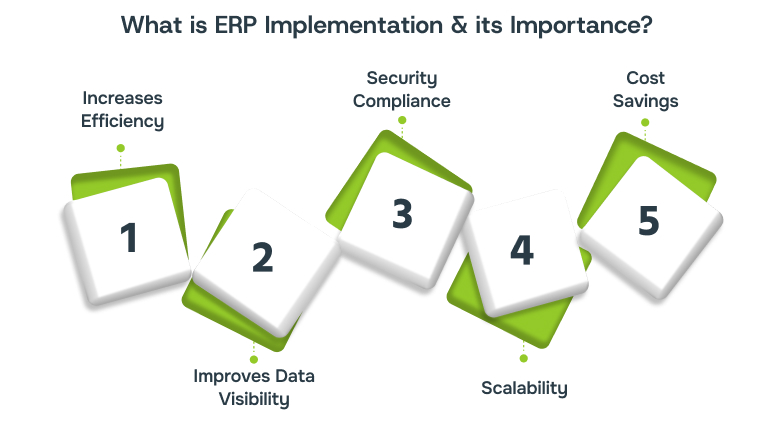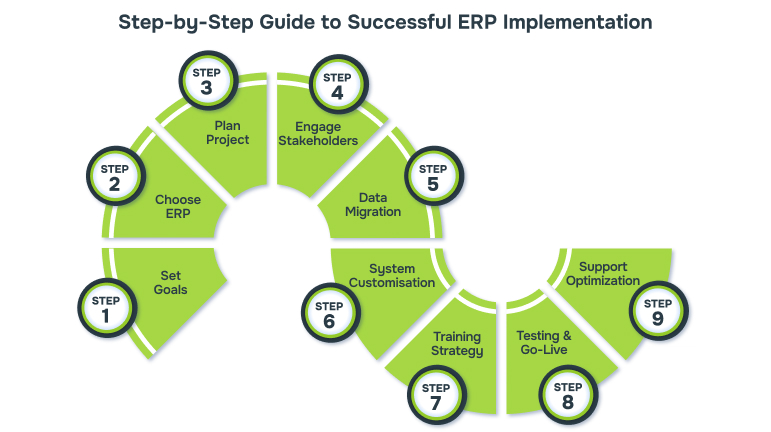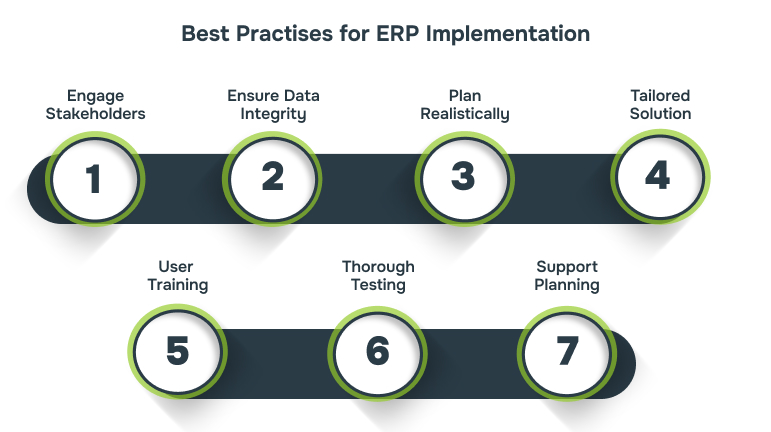ERP Implementation: Step-by-Step Guide to Success
Achieve ERP implementation success with this step-by-step guide. Learn to plan, select the right system, and ensure smooth data migration. Click to know more.

Choosing the right ERP software is a major decision that requires careful research and planning. While the implementation process can seem overwhelming, it doesn’t have to be. With the right guidance and support, you can manage it smoothly.
ERP implementation involves integrating the software into your business operations, bringing together functions such as finance, HR, inventory, and customer management into a single central system. When done correctly, it streamlines workflows, improves visibility, and boosts overall efficiency across your organisation.
However, it’s not without challenges. In fact, about 40% of UK CIOs report difficulties accessing, analysing, or utilising enterprise and customer data effectively for decision-making, highlighting persistent data management issues during or after ERP implementation. Addressing these challenges early is essential to ensure the system delivers accurate insights and supports informed decision-making across the business.
TL;DR
- Get clarity on each stage of ERP implementation, from setting goals to ongoing optimisation, with actionable tips and examples.
- Avoid common pitfalls like poor data migration, scope creep, and user resistance with proven best practises.
- Learn how to choose the right ERP system based on your industry needs, scalability, and deployment preference.
- Discover how Alberon ensures ERP success through tailored solutions, smooth integrations, and post-go-live support.
What is ERP Implementation & its Importance?

Today’s ERP systems are advanced, intelligent platforms that streamline operations by automating tasks and unifying inventory, product, manufacturing, distribution, and project data. They provide a single source of truth that empowers success in the digital economy, but first, your business must successfully complete the ERP implementation process.
The ERP software market in the UK is projected to reach $2.96 billion by 2025, reflecting strong demand for integrated business solutions. Enterprise Resource Planning (ERP) implementation refers to the process of deploying an ERP system to streamline and automate business processes. It plays a vital role in helping businesses operate more efficiently and make better decisions.
The importance of ERP implementation cannot be overstated, especially for mid-to-large UK businesses that need to adapt to growing demands and technological advancements. Here are some compelling reasons why ERP is crucial:
1. Increases Efficiency
By automating repetitive tasks and integrating workflows across departments, ERP systems streamline operations, reducing manual data entry and eliminating duplicate work. This leads to significant time savings and operational efficiency.
2. Improves Data Visibility
ERP systems centralise all your data, providing real-time insights into key business metrics. This means no more scattered spreadsheets or disconnected tools. Access to accurate and up-to-date information enhances decision-making and helps you respond quickly to changes in your industry.
3. Enhances Security and Compliance
With data protection and GDPR compliance top of mind for many UK businesses, ERP systems offer robust security features that ensure sensitive information is safeguarded. Compliance-ready solutions are built into the system, which is particularly important for industries like finance, healthcare, and professional services.
4. Scalability
As your business grows, your ERP system can scale with you. A properly implemented ERP solution can handle increasing transaction volumes and the expansion of business functions, allowing your company to keep pace with growth without the need for constant upgrades.
5. Cost Savings
By reducing operational inefficiencies, minimising human errors, and enabling faster decision-making, ERP systems can drive significant cost savings. These savings can be reinvested into other areas of your business to fuel further growth.
Step-by-Step Guide to Successful ERP Implementation

While ERP implementation can be a complex process, breaking it down into manageable steps will help ensure success. Follow this guide to ensure your ERP project is delivered on time, within budget, and with minimal disruption to daily operations.
1. Define Your Objectives
Before you start the implementation process, it’s important to define what you want to achieve clearly.
- Do you want to improve reporting accuracy?
- Is your goal to automate repetitive manual processes?
- Are you aiming to improve customer satisfaction with faster order fulfillment?
Establish clear KPIs aligned with your objectives, such as:
- Reduce the month-end closing time from 10 days to 3 days.
- Reduce stock discrepancies by 95%.
- Improve on-time delivery rates by 15%.
Tip: Engage stakeholders early to understand their challenges and align objectives with their pain points.
2. Select the Right ERP System
There are many ERP systems in the market, such as Microsoft Dynamics 365, SAP Business One, and NetSuite. To choose the right system:
- Categorise requirements into Essential, Desirable, and Nice-to-Have.
- Assess scalability and flexibility.
- Consider industry-specific capabilities (e.g., batch tracking in food manufacturing).
- Decide on deployment (Cloud, On-premises, or Hybrid).
- Evaluate costs, including licensing, support, and training.
Example: A professional services firm may prioritise time tracking, project billing, and resource management as essential features.
3. Develop a Project Plan
An ERP implementation typically takes 6–12 months, depending on complexity. Create a detailed project plan.
- Clear milestones (system selection, data migration, testing, go-live).
- Resource allocation (internal champions, external consultants).
- Risk management and contingency planning.
- Communication strategy to keep stakeholders informed.
Tip: Allow for buffer time to accommodate unexpected delays and avoid rushed decisions.
4. Engage Stakeholders
Involve key stakeholders from various departments early on in the process. This includes management, IT teams, operations, and end-users. Change management is critical:
- Communicate the purpose, benefits, and timelines of the ERP implementation early.
- Identify and empower “change champions” in departments.
- Host Q&A sessions to address concerns.
Outcome: Early engagement reduces resistance and increases user buy-in.
5. Data Migration
One of the most important tasks in ERP implementation is migrating data from legacy systems to the new ERP platform. Data is the backbone of your ERP system.
- Review and clean data from your legacy systems to remove duplicates and inaccuracies.
- Map data fields to the ERP system’s structure.
- Run test migrations to validate data accuracy.
Example: Migrating customer records requires ensuring consistency in addresses, contact details, and historical transactions to avoid customer service issues post-go-live.
6. System Customisation
Your ERP system should align with your workflows, not the other way around. Configure:
- Approval hierarchies in finance
- Custom reports for management
- Automated alerts for low stock or overdue invoices
Avoid excessive customisations that increase complexity, focusing on essential configurations that improve productivity.
7. Training and Change Management
A well-trained team is key to ERP success:
- Conduct hands-on workshops for end-users in their functional areas.
- Develop user manuals and quick reference guides.
- Offer post-go-live refresher training.
Tip: Use a “train the trainer” approach to build internal ERP experts for ongoing support.
8. Testing and Go-Live
Testing ensures your ERP system works as intended:
- Perform User Acceptance Testing (UAT) with real-life scenarios.
- Test financial workflows, order processing, and reporting.
- Validate migrated data accuracy.
Choose a go-live strategy:
- Big Bang: The Entire system goes live at once.
- Phased: Modules or departments go live sequentially.
- Parallel: Old and new systems run simultaneously for a transition period.
9. Ongoing Support and Optimisation
After thorough preparation:
- Roll out the system while monitoring closely.
- Address user queries promptly.
- Track system performance and resolve issues quickly.
Post-go-live, continue to refine processes, gather user feedback, and explore additional functionalities to maximise ROI.
Once your ERP system is up and running, the next step is to focus on what helps it succeed in the long run. By following best practices that keep things running smoothly and help you get the most value from your investment.
Best Practises for ERP Implementation

While following a structured implementation process is essential, adhering to best practises will further increase the likelihood of success. Here are some best practises to ensure your ERP project runs smoothly.
1. Involve Key Stakeholders Early
Stakeholder engagement is key to a smooth ERP implementation. Involve decision-makers, department heads, and end-users early in the process to align their expectations and gather insights into their specific needs. This can significantly reduce resistance and improve user adoption.
2. Prioritise Data Accuracy and Cleanliness
Data migration is often one of the most challenging aspects of ERP implementation. Clean, accurate data is vital for the successful functioning of the system. Make sure that all your legacy data is reviewed, cleansed, and properly mapped to the new system.
3. Set Realistic Timelines and Budgets
ERP projects often exceed initial expectations if not properly managed. Set realistic timelines and budgets, considering possible delays or unforeseen challenges. Always leave some buffer time for unexpected issues.
4. Customise for Your Business Needs
One size does not fit all when it comes to ERP systems. Ensure that the system is customised to fit your organisation’s specific processes and requirements. Avoid trying to fit your business into a generic solution.
5. Focus on User Training
Proper training is one of the most critical success factors in ERP implementation. Make sure your employees are well-trained in the new system, and provide ongoing support to ensure smooth adaptation.
6. Test, Test, and Test Again
Before going live, thorough testing is a must. This includes performance testing, functional testing, and user acceptance testing (UAT). Identify and fix issues early to ensure a smooth transition once the system is live.
7. Plan for Ongoing Support
Once your ERP system is live, it’s important to have a dedicated support team in place to address any issues. Ensure that your system is regularly optimised and updated to keep up with business growth and changes in technology.
How Alberon Helps with ERP Implementation
At Alberon, we understand that ERP implementation is a critical step in your business’s digital transformation journey. Our team of experts provides end-to-end support, from initial consultation to post-implementation training and support. Here’s how we can assist:
- Customised ERP Solutions: We work closely with you to develop Microsoft Dynamics 365 solutions that are tailored to your business needs, whether you’re in manufacturing, finance, or professional services.
- Seamless Integration: Our ERP solutions integrate seamlessly with your existing infrastructure, ensuring that all your systems work together in harmony.
- Data Migration & Security: We ensure a smooth transition from your old systems to your new ERP platform, safeguarding your data throughout the process.
- Ongoing Support: Our team is committed to providing continuous support, offering training, system updates, and troubleshooting to ensure your ERP system evolves with your business.
At Alberon, we support businesses in overcoming these challenges with expert consulting, seamless ERP implementation, and reliable support to ensure a smooth and successful transition to the Cloud.
Conclusion
ERP implementation is more than just a software upgrade; it’s a strategic investment in your business’s future. When done right, it can transform how your organisation operates, enabling greater efficiency, improved data visibility, and better decision-making.
However, the journey to a successful implementation requires clear planning, the right technology partner, and a commitment to change management. From defining your goals to post-go-live support, each step plays a vital role in ensuring your ERP system delivers long-term value.
Want to learn more? Contact Alberon today to explore the right ERP solution for your business.
FAQs on ERP Implementation
1. How long does ERP implementation take?
The timeline for ERP implementation depends on the complexity of the project and the size of the organisation. Typically, it is 6–12 months, depending on business size and complexity.
2. What are the common challenges of ERP implementation?
Some common challenges include data migration issues, resistance to change from staff, and delays in the customisation process.
3. Is ERP implementation costly?
Costs vary based on system choice and complexity, but the ROI through operational efficiencies and data-driven decisions outweighs the investment.
4. Can ERP systems be customised for specific industries?
Yes, ERP systems can be customised to meet the unique needs of different industries, such as manufacturing, finance, or education. Customisation ensures that the system supports your business processes efficiently.
5. How can Alberon help after ERP implementation?
Alberon provides ongoing support, including system optimisation, training, and troubleshooting, ensuring that your ERP system continues to serve your business needs effectively.
Get in Touch Today:
Ready to Improve your Business Productivity
Get a trusted partner to navigate your digital transformation. With Alberon, you can ensure a smooth transition, clear communication, and peace of mind.
